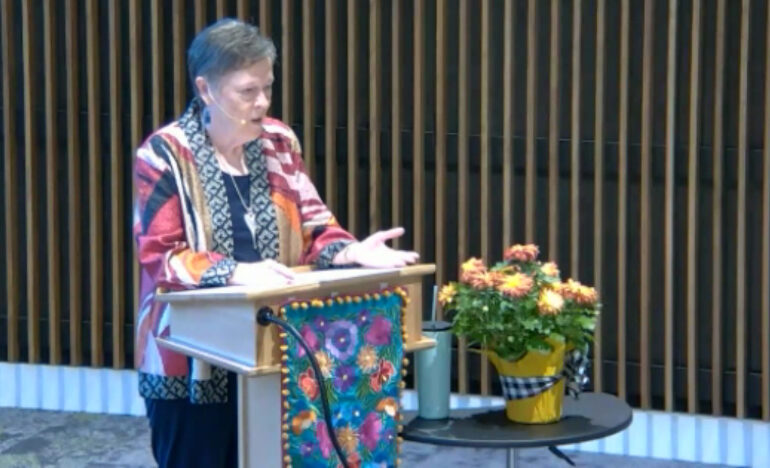Step by Step, Piece by Piece

An Assembling God’s Puzzle video
By Fr. Garry Richmeier, C.PP.S.
People come to me in counseling often because they are in great pain. Maybe their marriage is in shambles, or they are using alcohol or some other chemical to avoid problems, or they have run into unexpected problems that threaten to overwhelm them. Sometimes they come with a laundry list of difficulties that feels like a ten-ton boulder on their shoulders, ready to crush them. If there is one thing that is very human, it is our desire to avoid pain. So people come to counseling to find ways to end the pain they are enduring, and they want them NOW.
As a counselor I often find myself in the position of having to disappoint people by telling them there are no easy answers to ridding themselves of whatever is causing them pain, and there are no “quick fixes” to their problems. Of course, deep down inside, everybody knows this. If there were easy fixes to their problems, people would have found them already before coming to counseling. So, I get to tell them the hard truth they already know, but which they intensely dislike.
But I don’t just leave them there, in a pool of hopelessness, at the mercy of their problems. I offer them a “plan B.” In a nutshell, plan B is a process of addressing the different pieces of a problem one by one, rather than tackling the whole thing at once. It is like having to move a large pile of sand by hand. Moving it all at once is impossible, but doing it one shovelful at a time works.
Addressing a problem in this way takes time, and the results are not immediately obvious. And many people give up before achieving any permanent results. All of us are products of our modern culture, which tells us in many ways that there are quick fixes to any problem — pop a pill, watch a 10-minute YouTube video, win the lottery, etc. We think that plan B is needless and really won’t work anyway. So we lose patience and give up. A good number of people decide that they will endure the pain of the problem rather than do the long-term work of addressing all the different pieces of the problem.
But if a person’s pain is unpleasant enough, they may be up for a plan B. Most issues people deal with do not just appear overnight. If looked at closely, it usually can be seen how the problem has developed over a long period of time. And if it has taken a long time to develop, it only makes sense that it will take a significant amount of time to change it.
For example, a couple comes to marriage counseling because they want to end the pain of frequent arguments. They already know how not to argue. If nothing else, each can simply stay quiet. But there has been a dynamic building up over time in their relationship where he has stopped listening, or where she simply repeats criticisms.
To reduce arguments, the different pieces of their relational dynamic have to be changed, often one at a time. In this case, it will include things like making eye contact when conversing, using helpful tone and volume of how they say things, agreeing when to have discussions about important topics, offering constructive criticism rather than accusations, communicating appreciation for each other, etc. Each of those pieces of the relationship are important, but to work on changing each of those takes much time and effort.
Another example is a person comes to counseling because they’ve been fired from a job for the first time in their life, and they are struggling with the pain of failure and low self-worth. One piece of the situation is their long-held idea that they are important/worthwhile only if they succeed. This idea has developed over years. Working to change that piece of thinking can take a long time, but it can help reduce the pain somewhat.
The bad news is that there is no way to move a “ten-ton boulder” type of problem all at once. The good news is that dealing with smaller pieces of that boulder one by one is more manageable and possible, and with time can reduce the weight of the boulder.
We are creatures of habit. Habits can help us do repetitive things without expending too much time and energy. But when those habits start causing us problems (like habitually not listening to one’s spouse, or habitually thinking success is why I’m important), they can be a challenge to change. The old saying still holds true: “Rome wasn’t built in a day.”
Achieving anything important and long-lasting takes much time and effort. But if we are motivated enough, and we persevere in putting in the time and hard work that is necessary, we humans can do amazing things. Including reducing the pain caused by the many problems we must face.
All of the videos in this series can be found here: Assembly God’s Puzzle.
Never miss an article published on the Renewal Center website: Sign up to receive our newsletters.
[Fr. Garry Richmeier, a Precious Blood priest and spiritual director, holds a Master’s of Divinity Degree from St John’s University in Collegeville, Minnesota, and a Master’s of Counseling Psychology degree from the University of Missouri-Kansas City. He is a licensed professional counselor and a licensed marriage and family therapist.]
Photo ID 105453899 | Step Step © Designer491 | Dreamstime.com — Step by Step, Piece by Piece — An Assembling God’s Puzzle video
We’d Like to Hear from You!
We’d like to know what you think about this article. Send us a comment using the form below. Do you have a suggestion? Is there something you want to learn more about? Send us a note.
Related

Discover Lectio Divina
Presented by Kathy Keary
This is a recording of “Discover Lectio Divina” presented by Kathy Keary at Precious Blood Renewal Center in Liberty, Missouri, on Oct. 2, 2025.

Do You Hear What I Hear?
By Fr. Garry Richmeier, C.PP.S.
How can we avoid the harmful affects of the polarization that characterizes so much of our lives these days? One step toward this end is to cultivate a greater understanding and appreciation for the idea of relativity in human behavior.
Categories
Assembling God's Puzzle Coffee with Padre Cooking & Spirituality Encounters of the 4th Kind Family Matters Guided Meditations Reflections on the Eucharsitic Prayers Spiritual Resources Taize Prayers Teach Us to Pray The Contemplative Life Traveling with Pilgrims of Hope Uncategorized Videos Week of Prayer for Christian Unity When you need a little help
